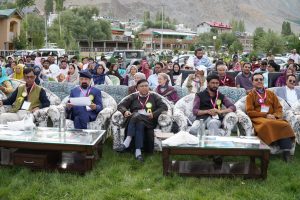21st International Association for Ladakh Studies Conference Concludes Successfully in Kargil

Kargil, August 30, 2025: The three-day long 21st International Association for Ladakh Studies (IALS) Conference concluded today in Kargil, marking the successful return of this globally respected academic forum to the region after a gap of ten years. The event, which drew together eminent scholars, writers, researchers, and students from Ladakh, across India, and several other countries, witnessed a total of 53 academic presentations on diverse themes connected to Ladakh’s history, culture, society, and contemporary challenges.
Chairman and Chief Executive Councillor (CEC), LAHDC Kargil, in his concluding remarks, said that the return of the IALS Conference to Kargil after a decade is not merely symbolic but deeply significant. He observed that this reflects the enduring bond between Ladakh and the Association and underlines the important place of Kargil in Ladakh’s intellectual and cultural heritage.
CEC, Kargil highlighted with pride that he was the first registered member of IALS from Kargil ladakh during 1995–96 and among the founding members of the Association. He stated that IALS has, for more than four decades, provided a vibrant platform for research, dialogue, and exchange, introducing Ladakh not merely as a geographical region but as a living culture of immense richness and diversity.
CEC Kargil appreciated the tireless dedication of scholars who have worked consistently to preserve and promote knowledge, culture, and research on Ladakh. He further added that in the present times, when challenges such as climate change, globalisation, and cultural shifts are rapidly reshaping Ladakh, the role of IALS has become more vital than ever. He urged scholars to explore Kargil in greater depth, particularly in the context of climate change, global warming, and pressing socio-cultural issues, and assured that LAHDC Kargil would extend full support to academic initiatives that strengthen the intellectual and cultural foundations of Ladakh.
Deputy Commissioner Kargil, Rakesh Kumar, while addressing the gathering, stated that the conference had great academic depth, with 53 research papers presented by national and international scholars. He emphasised that such platforms are not only important for sharing knowledge but also provide critical insights that can inform policy-making and future planning for Ladakh.
Member of Parliament Ladakh, along with distinguished writers, scholars, and students, also participated in the closing ceremony. They lauded the significance of the IALS platform in connecting Ladakh with the world of scholarship, helping preserve the region’s heritage, and giving global attention to contemporary issues faced by its people.
Adding to the richness of the conference, a new book titled Poetic Examples from the Second Chapter of Kāvyādarśa, authored by an Associate Professor from the Central Institute of Buddhist Studies (Deemed to be University), Leh, Ladakh, was formally launched. The book was received with appreciation by the participants as a valuable contribution to the literary and cultural scholarship of the region.
In her concluding address, President of IALS, Dr. Monisha Ahmed, extended sincere thanks to all writers, scholars, students, and researchers for attending the conference and presenting their valuable papers. She also expressed her deep gratitude to the District Administration Kargil, LAHDC Kargil, and the Ladakh Academy of Art, Culture and Languages (LAACL) for their wholehearted support, which ensured the success of the conference. Dr. Ahmed highlighted that the outcomes of this academic exchange will go a long way in strengthening the study of Ladakh while encouraging new voices in research.
The 21st IALS Conference concluded with a collective resolve to continue strengthening research, dialogue, and collaboration on Ladakh. The participants emphasised that while Ladakh faces new challenges of climate change, environment, and socio-cultural transformation, academic research and cultural dialogue remain central to preserving its identity and guiding its path toward a sustainable future.


